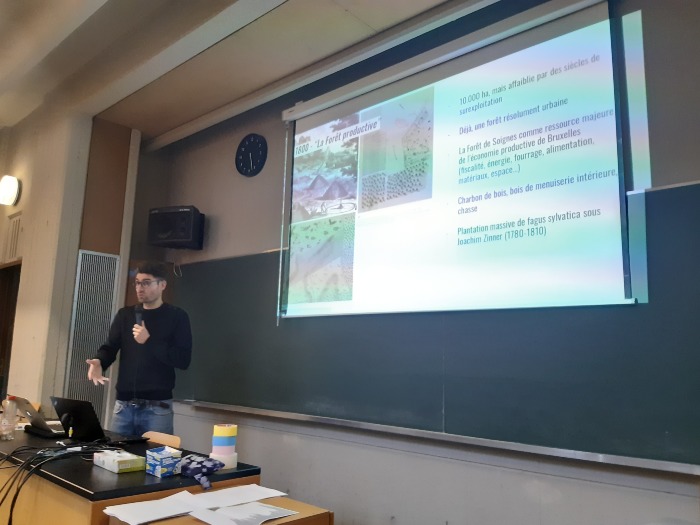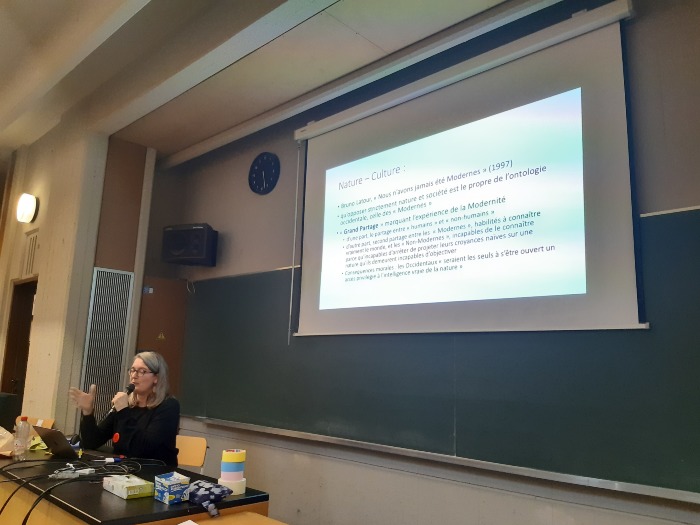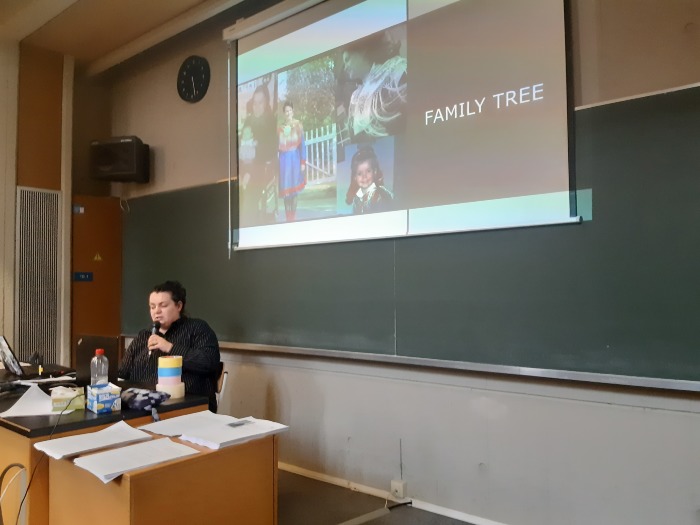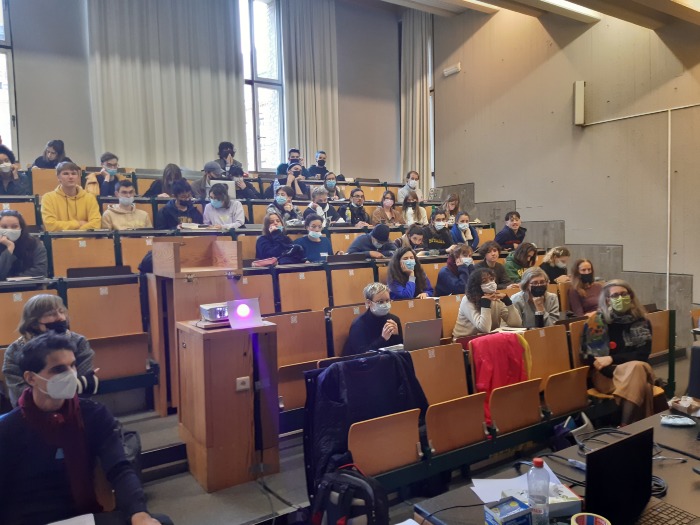— Seminar: On human, plant and artificial intelligences
- is part of Algoliterary Publishing: Fruit Rains
- has as contributor Jara Rocha
- has as contributor Outi Laiti
- has as contributor Stephan Kampelmann
- has as contributor Nathalie Grandjean
- type: Article
- ref: DOC.2023.10
- Creation date: October 25 2021
-
description:
Seminar organised in ESA Saint-Luc Bruxelles, with lectures by Jara Rocha (SP), Outi Laiti (FI), Stephan Kempelman (BE) and Nathalie Grandjean (BE).

- Outi Laiti and Jara Rocha
- 20211025_152322_seminar1.jpg
- image/jpeg
- 3.66 MB
- download

- Stephan Kampelmann
- 20211025_162537_seminar2.jpg
- image/jpeg
- 3.55 MB
- download

- Nathalie Grandjean
- 20211025_172905_seminar3.jpg
- image/jpeg
- 3.95 MB
- download

- Outi Laiti
- 20211025_151107_seminar0.jpg
- image/jpeg
- 3.66 MB
- download

- Audience: students ESA St-Luc + friends
- 20211025_152246_seminar_audience.jpg
- image/jpeg
- 3.21 MB
- download
Two lectures were given in English and two in French.
Wherever possible, translated texts of the lectures were provided.
A trans*feminist take on 'An Algoliterary Publishing House: making kin with trees' [EN]
Thinker and mumbler Jara Rocha introduced the research project by Anaïs Berck, for which this seminar tried to give a broader context. They did this in a critical trans*feminist way, providing reflections and questions that can help the research further. Unusual connections, surprising associations, farfetched ideas and oblique worldviews.
Jara Rocha works through the situated and complex forms of distribution of the technological with an antifa and trans*feminist sensibility. Tends to be found in tasks of remediation, action-research and in(ter)dependent curatorship, and their main areas of study have to do with the semiotic materialities of cultural urgencies. Together with Femke Snelting they are making a book titled “Volumetric Regimes: Material Cultures of Quantified Presences” and also with Helen Pritchard they currently work on The Underground Division: an emerging research on the co-constitution of the so-called body of the earth and the patriarchocolonial turbocapitalist volumetric regime. With Karl Moubarak and Cristina Cochior, they conform the Cell for Digital Discomfort at the 20/21 Fellowship for Situated Research of BAK, Utrecht. Jara lives in Barcelona, and their show "Naturoculturas son Disturbios" emits monthly from that city's local Dublab radio.
http://jararocha.blogspot.com/
Panepistemological aspects of research [EN]
Outi Laiti, Ph.D. is an Indigenous Sámi game researcher and designer. In 2020, gamesindustry.biz nominated her as one of the 100 Game Changers for her work on promoting e.g. Sámi gaming. She gave a talk on how Survivance, Indigenous worldview, Sámi intangible cultural heritage and cross-generational nature relationship can define Indigenous digital game design and research processes.
Outi Laiti is an Associate researcher at the University of Helsinki Indigenous studies. Her field of research is education and computer science with a focus on Sámi language and culture in digital games and programming. She is also active in designing and co-organizing Sami Game Jams and has been involved in several game development and educational projects in the past. Her doctoral thesis “Old Ways of Knowing, New Ways of Playing” published in January 2021, discusses the potential of collaborative game design to empower Indigenous Sámi.
The life of a cut tree [FR]
Stephan Kampelmann gave an overview of how trees are currently "treated". His point of departure is the Sonian Forest, where he is active in the Sonian Wood cooperative. He also extended towards the production, processing and sale of wood in Europe, on the existing labels that represent so-called sustainable wood production.
Stephan Kampelmann is co-founder of the Sonian Wood Coop, a Brussels-based cooperative with the mission to locally valorise wood from the Forêt de Soignes/Sonian Forest. He is an economist by training and teaches economics at the Faculty of Architecture La Cambre Horta of the ULB.
Connecting what had been separated [FR]
Can we imagine artificial intelligence and the intelligence of trees together, in the same gesture? How can we think of them as connected and not separate? Thanks to the work of Latour, Haraway, Tsing and Despret, we can deconstruct the separation between natures and technologies. Nathalie Grandjean guided us through this ecofeminist panorama.
is Doctor in Philosophy (UNamur, 2018). Her fields of research are body and technology, digital ethics, feminist and gender philosophy and ecofeminisms. She has edited the books « Corps et Technologies. Penser l’hybridité » (avec Claire Lobet, Peter Lang, 2012), « Valeurs de l’attention » (avec Alain Loute, Presses du Septentrion, 2019) et vient de publier « Généalogie des corps de Donna Haraway. Féminismes, diffractions, figurations » (Presses de l’ULB, 2021). She is also an administrator of Sophia, the Belgian gender studies network (www.sophia.be). She is currently a FNRS research fellow at the Université Saint-Louis (Brussels). Her project explores the political bodies of the Anthropocene, trying to rethink encorporation, subjectivation and temporalities from feminist and ecofeminist writings.